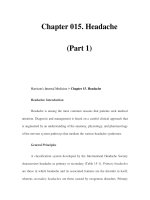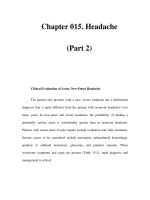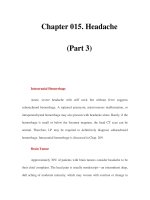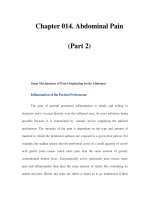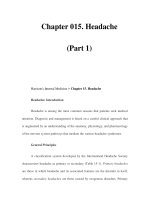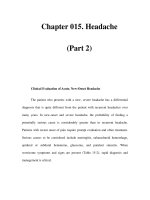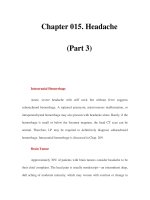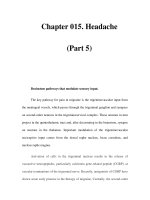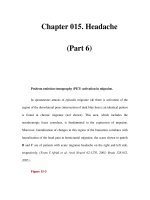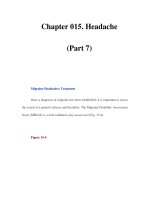Chapter 015. Headache (Part 2) doc
Bạn đang xem bản rút gọn của tài liệu. Xem và tải ngay bản đầy đủ của tài liệu tại đây (11.63 KB, 5 trang )
Chapter 015. Headache
(Part 2)
Clinical Evaluation of Acute, New-Onset Headache
The patient who presents with a new, severe headache has a differential
diagnosis that is quite different from the patient with recurrent headaches over
many years. In new-onset and severe headache, the probability of finding a
potentially serious cause is considerably greater than in recurrent headache.
Patients with recent onset of pain require prompt evaluation and often treatment.
Serious causes to be considered include meningitis, subarachnoid hemorrhage,
epidural or subdural hematoma, glaucoma, and purulent sinusitis. When
worrisome symptoms and signs are present (Table 15-2), rapid diagnosis and
management is critical.
Table 15-2 Headache Symptoms that Suggest a Serious Underlying
Disorder
"Worst" headache ever
First severe headache
Subacute worsening over days or weeks
Abnormal neurologic examination
Fever or unexplained systemic signs
Vomiting that precedes headache
Pain induced by bending, lifting, cough
Pain that disturbs sleep or presents immediately upon awakening
Known systemic illness
Onset after age 55
Pain associated with local tenderness, e.g., region of temporal artery
A complete neurologic examination is an essential first step in the
evaluation. In most cases, patients with an abnormal examination or a history of
recent-onset headache should be evaluated by a CT or MRI study. As an initial
screening procedure for intracranial pathology in this setting, CT and MRI
methods appear to be equally sensitive. In some circumstances a lumbar puncture
(LP) is also required, unless a benign etiology can be otherwise established. A
general evaluation of acute headache might include the investigation of
cardiovascular and renal status by blood pressure monitoring and urine
examination; eyes by fundoscopy, intraocular pressure measurement, and
refraction; cranial arteries by palpation; and cervical spine by the effect of passive
movement of the head and by imaging.
The psychological state of the patient should also be evaluated since a
relationship exists between head pain and depression. Many patients in chronic
daily pain cycles become depressed, although depression itself is rarely a cause of
headache. Drugs with antidepressant actions are also effective in the prophylactic
treatment of both tension-type headache and migraine.
Underlying recurrent headache disorders may be activated by pain that
follows otologic or endodontic surgical procedures. Thus, pain about the head as
the result of diseased tissue or trauma may reawaken an otherwise quiescent
migrainous syndrome. Treatment of the headache is largely ineffective until the
cause of the primary problem is addressed.
Serious underlying conditions that are associated with headache are
described below. Brain tumor is a rare cause of headache and even less commonly
a cause of severe pain. The vast majority of patients presenting with severe
headache have a benign cause.
Secondary Headache
The management of secondary headache focuses on diagnosis and
treatment of the underlying condition.
Meningitis
Acute, severe headache with stiff neck and fever suggests meningitis. LP is
mandatory. Often there is striking accentuation of pain with eye movement.
Meningitis can be easily mistaken for migraine in that the cardinal symptoms of
pounding headache, photophobia, nausea, and vomiting are present. Meningitis is
discussed in Chaps. 376 and 377.
